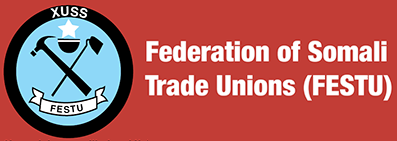On this International Women’s Day, the Federation of Somali Trade Unions (FESTU) salutes all Somali women workers in the formal and informal economy, for sustaining households, organisations, communities and society at large.
The COVID-19 pandemic revealed the close interrelationship between women’s private and public lives. Women were required, more than usual, to straddle various responsibilities in the domestic and public sphere in order to sustain their families, while still contributing to the social, economic and political development of Somalia. Somali women have been shouldering responsibilities not only for household production but also for schooling and childcare, while still attending to income-generation activities and professional responsibilities. This has assumed a certain elasticity on women’s time and energies, all the while failing to recognise women for their efforts.
In fact, working women continue to face obstacles in the labour market. Workplaces still tend to be male-dominated, while women struggle to occupy senior management and board positions in the private sector. Pre-conceived ideas about women’s abilities, personalities and leadership potential, often fuelled by long-held patriarchal and cultural beliefs, tend to close spaces and opportunities for women.
Workplaces still do not reflect an adequate degree of gender sensitivity; women’s lower wages indicate that women’s contributions to a company’s productivity is not recognised while some employment rights such as maternity pay are often left up to company discretion. Addressing these gaps and ensuring that women are properly financially remunerated will impact on how women experience and enjoy their personal time and time with their family.
In response to some of these issues, FESTU and its affiliated unions are proud to have contributed to the ratification of the ILO Convention 190 on violence and harassment. By ratifying this convention, Somalia promotes and realizes the right of everyone to a world of work free from violence and harassment, and recognises the impact that such violence has on an individual. Somalia is obligated to domesticate the convention to ensure that certain policies and practices within the workplace do not foster violence and harassment but rather offer concrete protection for women.
FESTU continues to work with the relevant stakeholders in calling for the effective domestication of ILO Convention 190 which will embed it into national legislation, including the Sexual Offence Bill (SOB).
Politics presents a similar challenge for women. The upcoming elections present an opportunity to make greater strides towards gender equality and fulfil the 30% female quota for parliamentary seats. Women make up approximately half the population of Somalia; it is therefore fair that their voices shape the laws and policies that will govern their lives.
Despite all the positive contributions that women continue to make to Somali society, they bear the brunt of gender-based violence. The home, far from being a safe haven, is a place of danger with a 2019 UNFPA brief highlighting that 65% of reported incidents took place at the survivors’ residences. Somalia continues to, among others, battle sexual violence, forced marriages and violence within conflict situations. These incidents have the potential to instil a cycle of negative coping mechanisms and generational violence if not addressed urgently.
Through its work, regional and international networks, and consistent visibility, FESTU and affiliated unions will continue to work tirelessly to champion true empowerment for women in Somalia.
